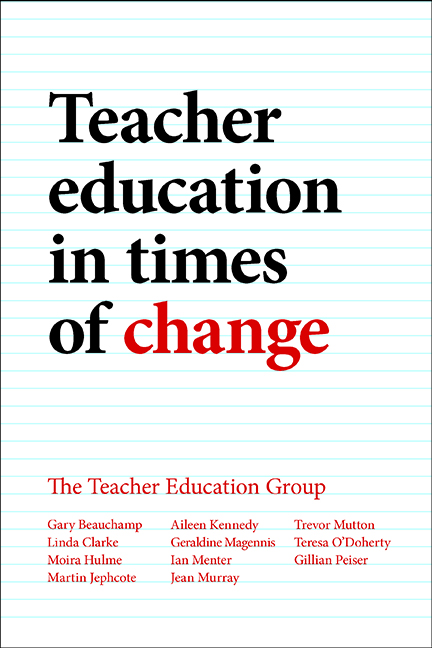Book contents
seven - Teacher education in Wales: towards an enduring legacy?
Published online by Cambridge University Press: 23 August 2022
Summary
Introduction
An analysis of teacher education in Wales demonstrates that the processes of policy making and, in turn, their implementation are complex and non-linear and that disputation between government and ‘stakeholders’ and also between sometimes competing stakeholders opens up space for mediation. Closing that space, that is, the ability of government to ensure that its policies are enacted in the ways in which it intended, or indeed for a stakeholder to assert its priorities, depends on the exercise of power and control over those who, in different ways, may work to mediate and recontextualise policy. For any particular policy initiative there is a ‘field’ of actors each with its own ability to exercise power and control and, the more contentious and in the public eye the policy, the larger the field and the more dispute there is likely to be. Also, the bigger the field, the bigger the struggle that government is likely to have to make, implement and enact its policy. At the heart of such struggles are ideological differences but set within a wider set of social and political interests. So, as Taylor et al (1997) suggest, ‘we need to observe politics in action, tracing how economic and social forces, institutions, people, interests, events and chance interact. Issues of power and interests need to be investigated’ (cited in Ball et al, 2012, p 3).
These matters are influenced by many factors but are framed by the physical size and make-up of the country and its population. Wales is a small country that has a strong cultural and linguistic tradition. At the most recent census in 2011, it had a population of 3.06 million, which is the largest it has ever been (www.ons.gov.uk/ons/rel/census/2011-census/population-and-household-estimates-for-wales/index.html). As a report conducted for the Equality and Human Rights Commission (2011) points out, Wales is also a relatively poor nation within the United Kingdom (UK). Pupils’ qualifications are strongly related to family income, and the report notes that approximately a fifth of the Welsh population live in poverty, and that individuals’ earnings in Wales are lower than the UK average. Of those people who are both disabled and have a work-limiting condition, 74% are not employed, a rate three times more than the UK average.
- Type
- Chapter
- Information
- Teacher Education in Times of ChangeResponding to challenges across the UK and Ireland, pp. 109 - 124Publisher: Bristol University PressPrint publication year: 2015



